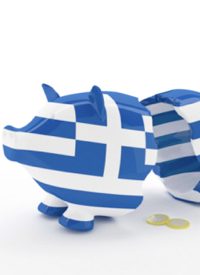
He said that the proposal, floated late last week as a condition for Greece to receive another $170-billion bailout from the European Central Bank, would force his country to choose between “financial assistance” and “national dignity.” He said that forcing Greece to accept such an overseer — with the power to veto Greek tax and spending decisions and make sure that debt service is paid before any other government expenditures — “ignores some key historical lessons.” An unnamed official privy to the conversation put it even more clearly: “If you went with that model, you’d do away with the normal democratic decision-making in a member state.”
Venizelos failed to be explicit about those “key historical lessons,” but the threat was clear: Here was Germany trying to enforce its version of financial austerity and “behavior” onto another sovereign nation, just as it did in the 1930s. It was also a reminder of the continuing failure of the EU, which was sold initially as a way to keep the German threat from rising again in the years following the Second World War.
Greece has so far been successful in negotiating a 70-percent “haircut” with private bondholders as part of the deal to bring its national debt down from the current 160 percent of Gross Domestic Product to an allegedly more manageable 120 percent by 2020. The bond holders will exchange their current bonds for new bonds that have 30 percent of the value of those they exchanged. They have agreed to take a loss of 70 percent of their original investment. But the Greek economy continues to languish, and its shortfall in tax revenues is widening rather than shrinking, putting into jeopardy another part of the agreement for new funding: bringing down the annual deficit from seven percent to one percent.
The clock is ticking for Greece and its bondholders. They have an $18-billion interest payment due on March 20 and no money to pay it. It’s clear that if the proposed bailout, as initially approved back in October, comes through, a large part of it will just be recycled back to the lenders in the everlasting and never-ending game of make believe: servicing debt with new debt.
Under the German proposal, Greece would be required not only to make its debt payments first before government expenditures, but also to guarantee that it wouldn’t threaten default in the future if it failed to live up to the agreement. As the Financial Times explained: “Athens would only be allowed to spend on the normal functioning of its government after servicing its debt. If such a law were adopted, the financial markets and other creditors would be reassured that defaults would not occur in the future.” Here’s the quote from the German proposal:
Greece cannot threaten its lenders with a default, but will instead have to accept further cuts in primary expenditures as the only possible consequence of any [non-payment of debt]. [Emphasis added.]
Put another way, under the agreement Greek citizens would be held hostage to the bankers forever.
True to authoritarian form, the troika of interventionists — the European Commission, the International Monetary Fund, and the European Central Bank — who continue to bludgeon Greece into accepting its terms, published a list of non-negotiable demands (calling them “prior actions”) that must be fulfilled in order to “qualify” for the new loans. The “prior actions” list is 10 pages long and includes demands to cut an additional 150,000 government jobs within three years, to slash defense and healthcare costs, and close down various government agencies.
Daniel Gros, an insider economist at the Center for European Policy Studies, is pessimistic that even with the acceptance of “the proposal” and the EU’s “overseer,” Greece will be able to recover from its economic and financial death spiral: “Greece [so far] has not taken any significant measures, and they have a political system that seems incapable of facing up to the crisis.” That’s another way of saying that unless Greece goes along, the flow of financial porridge stops.
Observers note that there is an ugly alternative to the continual giving away of slices of national sovereignty for those never-ending bowls of porridge: Exit the EU now. Eric Margolis, an international writer and commentator, says it would be better to leave sooner than later, meaning “the longer one delays [in] taking a loss, the worse it gets.”
It was the Greek government that fudged the numbers in order to qualify for the gravy train of the eurozone and its too-good-to-be-true flow of cheap debt just because they belonged. But that was yesterday. Today “there is no way,” contends Margolis, “Greece can ever make good on its debts.” But he warns that leaving the eurozone will be costly and painful:
Kicking Greece out of the [eurozone] will obviously create a huge explosion. Many Greek banks, which are also active in the Balkans and Cyprus, will go under. There will be runs on the banks by panicked Greek depositors. Greek trade will be disrupted. Russian banks will be shaken.
Europe’s reckless bankers, particularly the French, will suffer major losses on Greek public and private debt. They deserve it. The banking fools who piled into Greek debt should be fired.
Greece must swallow bitter medicine. Doing so is absolutely vital if the poison of too much debt is to be purged….
They will be fine on their own once the poison of debt leaves their system. Greece, always a poor nation, tried to live big like North Europeans — on credit. Greeks should go back to their former slower, more modest Mediterranean ways.
It’s doubtful that Margolis’ picture of a tranquil Greek future will happen. The EU is part of the New World Order program to bring recalcitrant nations such as Greece into the fold, by persuasion if possible, by force if necessary. The bowls of porridge, the Greeks are just now finding out, contain not nourishment but poison.



